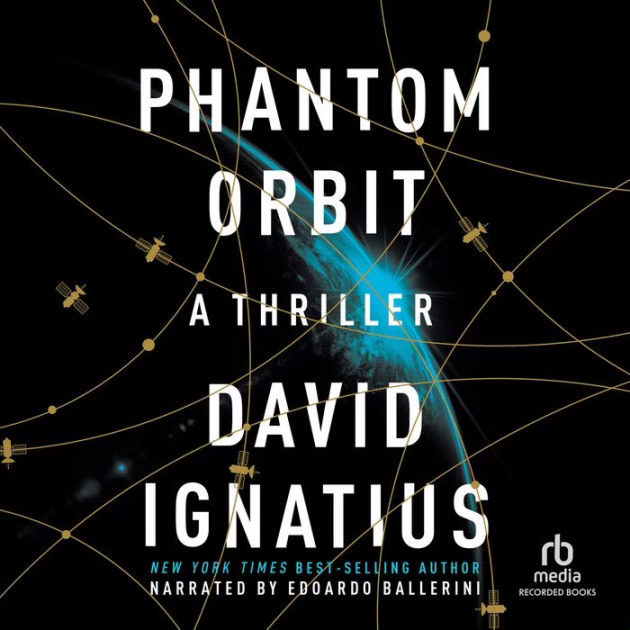High Anxiety
David Ignatius’ latest thriller is a tour de space force, spies and satellite warfare
HENRY R. SCHLESINGER
MAY 03, 2024
SpyTalk.
Spoiler Alert: The new spy thriller by David Ignatius has arrived just in time for beach season, and that’s good. But Phantom Orbit is not a “rollicking rollercoaster of international mayhem,” as so many breathless blurbs once described spy thrillers. This is a sober and engaging tale of both human drama and emerging technological threats, fitting neatly in the category of what Graham Greene called an “entertainment.”

David Ignatius (Indiana State University media photo)
Ignatius is well placed to tell the story. A native Washingtonian, veteran foreign correspondent turned prize-winning columnist for the Washington Post, and a former adjunct lecturer at Harvard’s Kennedy School of Government, he has been covering the intelligence community for nearly four decades. This is his twelfth novel of international intrigue, with multiple previous efforts hitting The New York Times bestseller list. His 2007 bestselling novel, Body of Lies, was made into the 2009 Ridley Scott film of the same title starring Leonardo DeCaprio and Russell Crowe. And while the Middle East was his beat for years, more recently he has been turning his eye to Chinese intelligence operations, notably with his novella, The Tao of Deception, serialized in the Washington Post’s editorial pages in four parts last year, and the novel, The Quantum Spy (2018).
As the title of his latest effort would suggest, the focus of his story is satellite technology. Space, of course, is the domain of critical government, corporate, and consumer infrastructure and, as such, holds the potential for all manner of mischief, including hostilities generally associated with warfare. This is a point, as Ignatius makes abundantly clear, not only worth knowing but pondering to the point of fully understanding. To his credit, he manages to provide a painless primer on satellites, the myriad roles they play, and the hideous complexity of operating in space. By the end of the book the reader will know about Low Earth Orbits, ground stations, and other details of the space business.
Briefly stated, the book’s action focuses on the lives and careers of two unlikely, though engaging, protagonists: Ivan Volkov, a Russian scientist guided into working on satellite technology, and Edith Ryan, an intelligence officer recruited by the CIA while a student at Yale. That one of the protagonists is named Ryan while another, albeit ancillary, character is named Hunt may be a puckish nod to two popular American espionage icons.
The action begins in the mid-1990s and carries through to near present day, a span representing a critical time in geopolitics and technological advances that saw the ascendancy of China as a technological and economic force as well as the relative decline of the former Soviet Union on the world stage.
The protagonists, who are just starting their careers at the beginning of the book, will see their professional lives intertwine or pass close to one another, like orbiting satellites. This is a story of large-brained individuals working within their respective systems, sidetracked, bullied, suffering setbacks, and surviving the not always pleasant pragmatism of bureaucracies with their integrity more or less intact.
It’s definitely not James Bond. There is no gunplay, high-speed chases or any of the other flashy exotica associated with traditional espionage fiction. It’s not that kind of book, and that’s a good thing.
However, one wonders what the intellectual historian Jacques Barzun, who so thoroughly lambasted the work of Ian Fleming and John Le Carré in his landmark 1965 American Scholar essay, “Meditations on the Literature of Spying,” would think of Phantom Orbit and this newish breed of fictional espionage protagonist. Although a dedicated fan of murder mysteries, Barzun was, apparently, disdainful regarding the noirish lives and lifestyles of Cold War era fictional spies.
For the most part the characters presented by Ignatius live ordinary lives burdened by secrets and compelled to do what they believe to be the right thing. They labor in relatively obscure and little understood fields, well aware of larger consequences. An early book of this genre that comes to mind would be The Blonde Countess (1933) by the ceaselessly self-promoting cryptographer Herbert O. Yardley. It was later made into the 1935 film Rendezvous, starring William Powell as swashbuckling codecracker.
Although not buckling any swashes, it is Phantom Orbit’s Volkov who remains central to the plot. A brilliant scientist in the old school-true believer mold, his talents are recognized as high value to the advancement of satellite technology, first by China, then Russia, and America.

An earthbound prize in the new space race, Volkov is, somewhat quaintly, motivated by neither money nor political ideology betray his motherland. It is fair to say, that of his three suitors, China proves the most attentive throughout most of the book. Edith Ryan, who identified Volkov of possible value to U.S. intelligence, struggles within an agency often unkind to women, though perseveres long enough to see the beginning of changes taking place.
With decades of reporting on espionage to his credit, Ignatius clearly knows the spy business at the granular level. Thankfully, he doesn’t overburden readers with an alphabet soup of forgettable acronyms, bureaucratic jargon, or expository organizational charts. Perhaps this derives from confidence that he doesn’t require the swagger of the arcane to establish credibility, or he’s simply a kind soul that has taken pity on the reader.
By the same token, there is a ring of truth to every operation, motivation, and official decision, including those featuring sophisticated technological elements. When the “inside baseball” elements of espionage in general or a specific agency are offered up, they are treated somewhat casually within the story. On one character’s retirement from the CIA, he describes the significance of the Career Intelligence Medal. In another instance, he details the work of the CIA’s Directorate of Science and Technology, which ranges from the “big tech” of satellites to small gadgetry of agent operations. As one might expect, the FSB, Russia’s internal security service, makes a recognizable and suitably disquieting appearance, and we see time has not significantly altered the Chekist mindset in the decades since the Cold War and KGB. However, perhaps even more importantly, this book provides an introduction to the operations of the Ministry of State Security (MSS), China’s principal civilian spy service. In this regard, China, “the world’s workshop,” has established a very formidable espionage enterprise.
It is fair to say that both Volkov and Ryan are drawn well enough to figure as solo central characters in their own books, though taken together the result is far richer and more impressive. There is a third character, however, and that is the crowded piece of real estate surrounding Earth with its thousands of satellites. In the hands of Ignatius, space is as much a part of the story as early Cold War Vienna in Graham Greene’s The Third Man or Rick’s cafe in World War Two Casablanca—and not lacking in intrigue or unsavory elements. To perhaps belabor the point, many governments, reminiscent of Claude Rains, profess to be shocked, shocked that spying is taking place in space.
Lastly, as with real spies, who will present a fiction to obtain a valuable truth, Ignatius’ work offers up a compelling fiction to deliver the broad strokes of a larger truth. And did I mention? It's a great beach read.
Phantom Orbit: A Thriller (W.W. Norton & Company) is available for purchase online in advance of its May 7 publication date. Washington, DC -area readers are encouraged to patronize Politics and Prose, an independent bookstore.
No comments:
Post a Comment